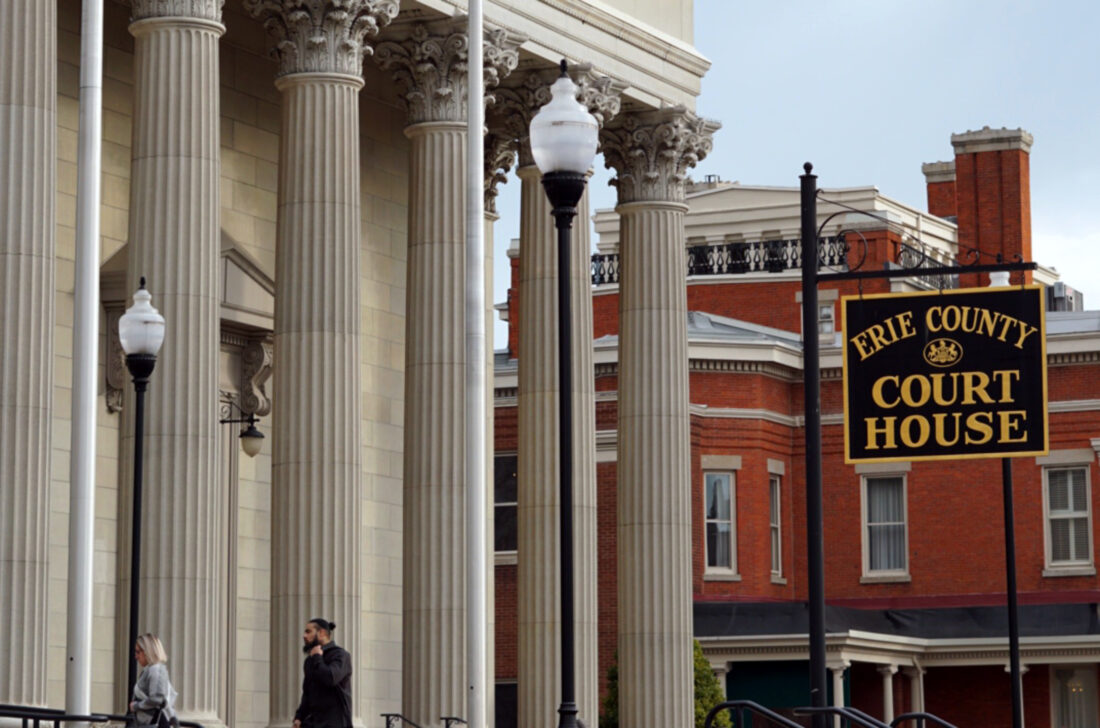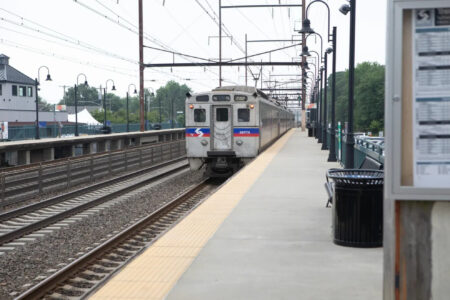Safety nets are likely to be the first affected by a continued Pa. budget impasse

Capital-Star photo by Hannah McDonald The Erie County Courthouse is pictured.
If the state budget paralysis in Harrisburg continues much longer, Pennsylvanians with real problems will be the first to feel the pain, advocates for county governments and human services say.
Pennsylvania’s 67 counties serve, in-part, as conduits to deliver services to people that are paid for by the state and federal governments. And without an approved budget and accompanying legislation, the commonwealth doesn’t have the legal authority to distribute those funds.
That means nearly $530 million in payments would be delayed for programs including rape crisis centers, child support enforcement, behavioral health services, county and municipal health departments, maternal and child health, opioid response and Area Agencies on Aging, according to a letter to health and human services providers from the Shapiro administration’s top budget official.
The possibility that will happen has county administrators from Erie to Philadelphia scrambling to find ways to continue paying service providers in the absence of a budget deal.
“This is an across the board problem where county budgets are dependent on state dollars for services,” Kyle Kopko, executive director of the County Commissioners Association of Pennsylvania.
The most likely stopgap measures include temporary reductions in services and reallocation of funds from other parts of county budgets, Kopko said, adding that such short-term fixes can have a cascading effect on county services.
“We only have so much money to go around. Even if we have to reallocate money it’s going to affect somewhere else,” he said.
Northampton County Commissioner Lori Vargo Heffner said that creates gaps in a county’s ability to deliver services, which assist and protect people who are struggling to maintain stability in their lives and those of their families. When services are curtailed, people receiving mental health support can lose appointments, are unable to get medications and become more vulnerable.
“My great concern with this is, I understand that part of politics is like a game of cards sometimes … but this is really dangerous when you’re playing with people’s lives,” Vargo Heffner said. “Is it a child who gets abused? Is it an elder who gets neglected?”
When safety net programs fail, it also places additional stress on other county departments including the criminal justice and corrections systems, Richard Edley, executive of the Rehabilitation and Community Providers Association, which advocates for disability support and behavioral health providers, said.
“The state still ends up paying, just in costly and inappropriate ways,” he said.
The state spending plan is due by June 30 each year to coincide with the beginning of a new fiscal year. The budget process begins in February, when the governor presents his proposals for hundreds of programs and services and projections of revenue to pay for them.
Both chambers of the state legislature must agree on a version of that plan and pass legislation to authorize the administration to spend the money. More often than not in the last few years, the legislature misses its deadline, sometimes by months.
The Democratic-controlled House passed a $50.6 billion version of the budget on July 14, putting the ball in the Republican-led Senate’s court. Since then, neither side has said much about where negotiations stand.
Gov. Josh Shapiro said Tuesday that he has been working with House Majority Leader Matt Bradford (D-Montgomery) and Senate Majority Leader Joe Pittman (R-Indiana) to narrow the gap between the sides.
“It’s slow, but we’re making progress,” he told reporters at a news conference. “I think all of us understand two things. One, we’ve got to compromise. And two, I think we all wish it was done sooner, but I think we understand the need to deliver for the good people of Pennsylvania.”
“We understand what the issues are, and we’re working through finding common ground and compromise,” Shapiro added.
The delay also causes problems for other parts of the government that depend on state disbursements to pay employees and bills.
The commonwealth’s 500 school districts are required to pass their budgets by the same deadline as the state. But they often don’t know how much money the state will provide until well after.
Greater Johnstown School District Superintendent Amy Arcurio said a late budget can force districts to take out loans to make payroll.
“We surely don’t want to do that because we have to pay interest and it’s money we haven’t planned for,” she said. And it’s money the district can’t get back.
Among the poorest school districts in the state, Arcurio said Johnstown is constrained in its ability to raise money through local property taxes. It is among the 370 districts that receive additional funding to ensure its per-pupil spending is adequate under a fair funding formula implemented in the last state budget.
That was in response to a 2023 court ruling that the commonwealth’s reliance on property taxes to pay for education put students in the poorest communities at a disadvantage. And in a community like Johnstown, which has among the highest poverty rates in the state, many families also rely on the health and social services that could be jeopardized, Arcurio said.
“At the end of the day all of those organizations are connected to school districts … it feeds into mental health support for our students and drug and alcohol treatment for families,” she said.
Edley said concern for human services at the county level is compounded by the federal government’s planned Medicaid cuts. But, he noted services managed through Medicaid will continue uninterrupted in the absence of a state budget.
“What really gets impacted is what is state- and county-funded only,” he said. Those programs include mental health, substance abuse and homeless services. Even a temporary disruption in funding can put stress on the whole system, Edley said.
“Typically, providers have found every possible way to keep it open,” he said, adding that providers pare down services and turn to lines of credit. “When you look at these safety net providers, they’ll do anything before they say the program is.”
The downside to their resiliency, Edley added, is that it leads lawmakers to believe there are no consequences to a late budget.
“When this happens year after year it gets tougher and tougher for the system to absorb it,” he said.
——
Pennsylvania Capital-Star is part of States Newsroom, a network of news bureaus supported by grants and a coalition of donors as a 501c(3) public charity. Pennsylvania Capital-Star maintains editorial independence. Contact Editor Tim Lambert for questions: info@penncapital-star.com. Follow Pennsylvania Capital-Star on Facebook and Twitter.




